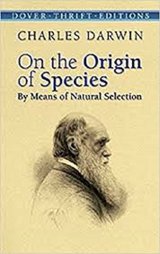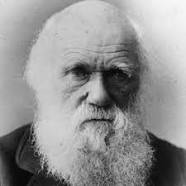On the Origin of Species By Means of Natural Selection Page #5
On the Origin of Species, published on 24 November 1859, is a work of scientific literature by Charles Darwin which is considered to be the foundation of evolutionary biology. Darwin's book introduced the scientific theory that populations evolve over the course of generations through a process of natural selection.
When we attempt to estimate the amount of structural difference between the domestic races of the same species, we are soon involved in doubt, from not knowing whether they have descended from one or several parent-species. This point, if it could be cleared up, would be interesting; if, for instance, it could be shown that the greyhound, bloodhound, terrier, spaniel, and bull-dog, which we all know propagate their kind so truly, were the offspring of any single species, then such facts would have great weight in making us doubt about the immutability of the many very closely allied and natural species--for instance, of the many foxes--inhabiting different quarters of the world. I do not believe, as we shall presently see, that all our dogs have descended from any one wild species; but, in the case of some other domestic races, there is presumptive, or even strong, evidence in favour of this view. It has often been assumed that man has chosen for domestication animals and plants having an extraordinary inherent tendency to vary, and likewise to withstand diverse climates. I do not dispute that these capacities have added largely to the value of most of our domesticated productions; but how could a savage possibly know, when he first tamed an animal, whether it would vary in succeeding generations, and whether it would endure other climates? Has the little variability of the ass or guinea-fowl, or the small power of endurance of warmth by the rein-deer, or of cold by the common camel, prevented their domestication? I cannot doubt that if other animals and plants, equal in number to our domesticated productions, and belonging to equally diverse classes and countries, were taken from a state of nature, and could be made to breed for an equal number of generations under domestication, they would vary on an average as largely as the parent species of our existing domesticated productions have varied. In the case of most of our anciently domesticated animals and plants, I do not think it is possible to come to any definite conclusion, whether they have descended from one or several species. The argument mainly relied on by those who believe in the multiple origin of our domestic animals is, that we find in the most ancient records, more especially on the monuments of Egypt, much diversity in the breeds; and that some of the breeds closely resemble, perhaps are identical with, those still existing. Even if this latter fact were found more strictly and generally true than seems to me to be the case, what does it show, but that some of our breeds originated there, four or five thousand years ago? But Mr. Horner's researches have rendered it in some degree probable that man sufficiently civilized to have manufactured pottery existed in the valley of the Nile thirteen or fourteen thousand years ago; and who will pretend to say how long before these ancient periods, savages, like those of Tierra del Fuego or Australia, who possess a semi-domestic dog, may not have existed in Egypt? The whole subject must, I think, remain vague; nevertheless, I may, without here entering on any details, state that, from geographical and other considerations, I think it highly probable that our domestic dogs have descended from several wild species. In regard to sheep and goats I can form no opinion. I should think, from facts communicated to me by Mr. Blyth, on the habits, voice, and constitution, etc., of the humped Indian cattle, that these had descended from a different aboriginal stock from our European cattle; and several competent judges believe that these latter have had more than one wild parent. With respect to horses, from reasons which I cannot give here, I am doubtfully inclined to believe, in opposition to several authors, that all the races have descended from one wild stock. Mr. Blyth, whose opinion, from his large and varied stores of knowledge, I should value more than that of almost any one, thinks that all the breeds of poultry have proceeded from the common wild Indian fowl (Gallus bankiva). In regard to ducks and rabbits, the breeds of which differ considerably from each other in structure, I do not doubt that they all have descended from the common wild duck and rabbit. The doctrine of the origin of our several domestic races from several aboriginal stocks, has been carried to an absurd extreme by some authors. They believe that every race which breeds true, let the distinctive characters be ever so slight, has had its wild prototype. At this rate there must have existed at least a score of species of wild cattle, as many sheep, and several goats in Europe alone, and several even within Great Britain. One author believes that there formerly existed in Great Britain eleven wild species of sheep peculiar to it! When we bear in mind that Britain has now hardly one peculiar mammal, and France but few distinct from those of Germany and conversely, and so with Hungary, Spain, etc., but that each of these kingdoms possesses several peculiar breeds of cattle, sheep, etc., we must admit that many domestic breeds have originated in Europe; for whence could they have been derived, as these several countries do not possess a number of peculiar species as distinct parent-stocks? So it is in India. Even in the case of the domestic dogs of the whole world, which I fully admit have probably descended from several wild species, I cannot doubt that there has been an immense amount of inherited variation. Who can believe that animals closely resembling the Italian greyhound, the bloodhound, the bull-dog, or Blenheim spaniel, etc.--so unlike all wild Canidae--ever existed freely in a state of nature? It has often been loosely said that all our races of dogs have been produced by the crossing of a few aboriginal species; but by crossing we can get only forms in some degree intermediate between their parents; and if we account for our several domestic races by this process, we must admit the former existence of the most extreme forms, as the Italian greyhound, bloodhound, bull-dog, etc., in the wild state. Moreover, the possibility of making distinct races by crossing has been greatly exaggerated. There can be no doubt that a race may be modified by occasional crosses, if aided by the careful selection of those individual mongrels, which present any desired character; but that a race could be obtained nearly intermediate between two extremely different races or species, I can hardly believe. Sir J. Sebright expressly experimentised for this object, and failed. The offspring from the first cross between two pure breeds is tolerably and sometimes (as I have found with pigeons) extremely uniform, and everything seems simple enough; but when these mongrels are crossed one with another for several generations, hardly two of them will be alike, and then the extreme difficulty, or rather utter hopelessness, of the task becomes apparent. Certainly, a breed intermediate between TWO VERY DISTINCT breeds could not be got without extreme care and long-continued selection; nor can I find a single case on record of a permanent race having been thus formed.
Translation
Translate and read this book in other languages:
Select another language:
- - Select -
- 简体中文 (Chinese - Simplified)
- 繁體中文 (Chinese - Traditional)
- Español (Spanish)
- Esperanto (Esperanto)
- 日本語 (Japanese)
- Português (Portuguese)
- Deutsch (German)
- العربية (Arabic)
- Français (French)
- Русский (Russian)
- ಕನ್ನಡ (Kannada)
- 한국어 (Korean)
- עברית (Hebrew)
- Gaeilge (Irish)
- Українська (Ukrainian)
- اردو (Urdu)
- Magyar (Hungarian)
- मानक हिन्दी (Hindi)
- Indonesia (Indonesian)
- Italiano (Italian)
- தமிழ் (Tamil)
- Türkçe (Turkish)
- తెలుగు (Telugu)
- ภาษาไทย (Thai)
- Tiếng Việt (Vietnamese)
- Čeština (Czech)
- Polski (Polish)
- Bahasa Indonesia (Indonesian)
- Românește (Romanian)
- Nederlands (Dutch)
- Ελληνικά (Greek)
- Latinum (Latin)
- Svenska (Swedish)
- Dansk (Danish)
- Suomi (Finnish)
- فارسی (Persian)
- ייִדיש (Yiddish)
- հայերեն (Armenian)
- Norsk (Norwegian)
- English (English)
Citation
Use the citation below to add this book to your bibliography:
Style:MLAChicagoAPA
"On the Origin of Species By Means of Natural Selection Books." Literature.com. STANDS4 LLC, 2025. Web. 8 Jan. 2025. <https://www.literature.com/book/on_the_origin_of_species_by_means_of_natural_selection_323>.




Discuss this On the Origin of Species By Means of Natural Selection book with the community:
Report Comment
We're doing our best to make sure our content is useful, accurate and safe.
If by any chance you spot an inappropriate comment while navigating through our website please use this form to let us know, and we'll take care of it shortly.
Attachment
You need to be logged in to favorite.
Log In